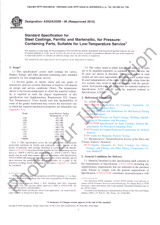Wir benötigen Ihre Einwilligung zur Verwendung der einzelnen Daten, damit Sie unter anderem Informationen zu Ihren Interessen einsehen können. Klicken Sie auf "OK", um Ihre Zustimmung zu erteilen.
ASTM D5015-15(2022)
Standard Test Method for pH of Atmospheric Wet Deposition Samples by Electrometric Determination
Name übersetzen
NORM herausgegeben am 1.3.2022
Informationen über die Norm:
Bezeichnung normen: ASTM D5015-15(2022)
Ausgabedatum normen: 1.3.2022
SKU: NS-1054468
Zahl der Seiten: 6
Gewicht ca.: 18 g (0.04 Pfund)
Land: Amerikanische technische Norm
Kategorie: Technische Normen ASTM
Kategorie - ähnliche Normen:
Die Annotation des Normtextes ASTM D5015-15(2022) :
Keywords:
atmospheric deposition, hydrogen ion, low ionic strength solutions, pH, precipitation, wet deposition,, ICS Number Code 71.040.50 (Physicochemical methods of analysis)
Ergänzende Informationen
| Significance and Use | ||||||||||||||||||
|
5.1?The accurate measurement of pH in atmospheric wet deposition is an essential and critically important component in the monitoring of atmospheric wet deposition for trends in the acidity and overall air quality. Atmospheric wet deposition is, in general, a low ionic strength, unbuffered solution. Special precautions, as detailed in this test method, are necessary to ensure accurate pH measurements 5.2?This test method is applicable only to the measurement of pH in atmospheric wet deposition. Its use in other applications may result in inaccuracies. 5.3?Fig. 1 provides a frequency distribution of precipitation pH values measured in conjunction with a national monitoring program within the United States. These data are an indication of the range of pH values common to atmospheric wet deposition. FIG. 1 Frequency Distribution of Measured Laboratory pH of Atmospheric Wet Deposition From the 1984 National Atmospheric Deposition Program (NADP)/National Trends Network (NTN) |
||||||||||||||||||
| 1. Scope | ||||||||||||||||||
|
1.1?This test method is applicable to the determination of pH in atmospheric wet deposition samples by electrometric measurement using either a pH half cell with a reference probe or a combination electrode as the sensor. 1.2?The values stated in SI units are to be regarded as standard. No other units of measurement are included in this standard. 1.3?This standard does not purport to address all of the safety concerns, if any, associated with its use. It is the responsibility of the user of this standard to establish appropriate safety, health, and environmental practices and determine the applicability of regulatory limitations prior to use. 1.4?WarningMercury has been designated by many regulatory agencies as a hazardous material that can cause serious medical issues. Mercury, or its vapor, has been demonstrated to be hazardous to health and corrosive to materials. Caution should be taken when handling mercury and mercury containing products. See the applicable product Safety Data Sheet (SDS) for additional information. Users should be aware that selling mercury or mercury-containing products into your state or country may be prohibited by law. 1.5?This international standard was developed in accordance with internationally recognized principles on standardization established in the Decision on Principles for the Development of International Standards, Guides and Recommendations issued by the World Trade Organization Technical Barriers to Trade (TBT) Committee. |
||||||||||||||||||
| 2. Referenced Documents | ||||||||||||||||||
|
Empfehlungen:
Aktualisierung der Gesetze
Wollen Sie sich sicher sein, dass Sie nur die gültigen technischen Vorschriften verwenden?
Wir bieten Ihnen Lösungen, damit Sie immer nur die gültigen (aktuellen) legislativen Vorschriften verwenden könnten.
Brauchen Sie mehr Informationen? Sehen Sie sich diese Seite an.




 Cookies
Cookies
